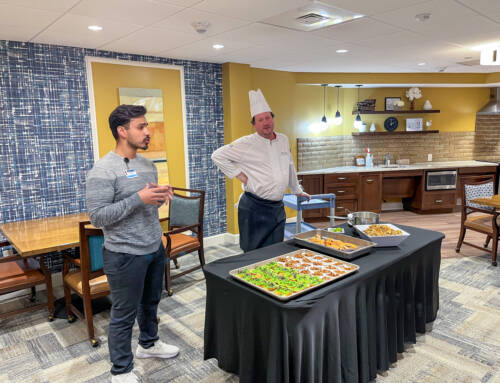Overview
This article is based on a presentation given by Charles Duffy, M.D. and Ph. D, at Masonic Village at Elizabethtown. A neurologist at Penn State Health’s Milton S. Hershey Medical Center, he treats patients with dementia and other cognitive disorders.
Aging and Your Brain
All individuals experience”normal functional limits in what you can see, do and think” as they age.
“The brain is not an infinite resource,” Dr. Duffy said. “Aging makes it smaller; education makes it bigger.”
The aging process affects each person differently, exaggerating strengths and weaknesses. However, medical research has found that memory and attention are most affected by aging, since, according to Dr. Duffy, “memory requires attention and attention requires memory.”
Dementia vs Alzheimer’s
For some, the normal age-related decline in brain function is complicated by developing cognitive disorders like Alzheimer’s disease and dementia. Dementia has four common causes, each affecting different areas of the brain. Movement disorders affect the center of the brain and gray matter. Vascular disorders, which are very common, target the brain’s blood vessels. Fronto-temporal dementia affects the frontal and temporal lobes. Alzheimer’s disease, “the most common cause of dementia in the early 21st century United States,” affects the back half of the brain. Amyloid proteins build up in the brain and create toxic plaques. Early-onset Alzheimer’s – categorized by a rate of onset before age 65 – makes up 1.25% of cases and is usually genetic. Late-onset Alzheimer’s – categorized by a rate of onset after age 65 – makes up 99% of cases.
How to Protect Your Brain from Dementia
Currently, no cure for dementia exists. Medications, like Aricept and Namenda, and therapies stabilize patients and increase their quality of life, but these only slow down the rate of cognitive decline, not stop it. As such, the best you can do for yourself to reduce your chances of developing dementia is to be proactive and practice good health habits.
“It is so much easier to prevent a disease than to reverse it,” Dr. Duffy said.
Dr. Duffy and other medical professionals recommend regular physical, mental and social activity to keep your body and mind sharp.
“Continuing healthy aging is the goal,” he said.
What is Masonic Villages Doing for Residents with Cognitive Decline and Cognitive Disorders?
The Baird Wellness Center’s Brain Fitness group holds regular meetings where they play board, card and strategy games to give their brains a workout. They also learn strategies for better brain health through monthly lectures from wellness specialist Jamie Rosenshine. For residents and community members already dealing with memory issues, Masonic Village Home Care services are available to residents in Elizabethtown and Sewickley and to the greater Elizabethtown community, helping ease caregivers’ stress or those with cognitive impairments maintain independence. For those who need a higher level of care, the memory support neighborhoods at Masonic Village at Elizabethtown, Masonic Village at Sewickley and Masonic Village at Warminster provide individualized care in a secure environment.
Learn more about Masonic Villages’ memory support programs – available at our Elizabethtown and Sewickley locations – here.




